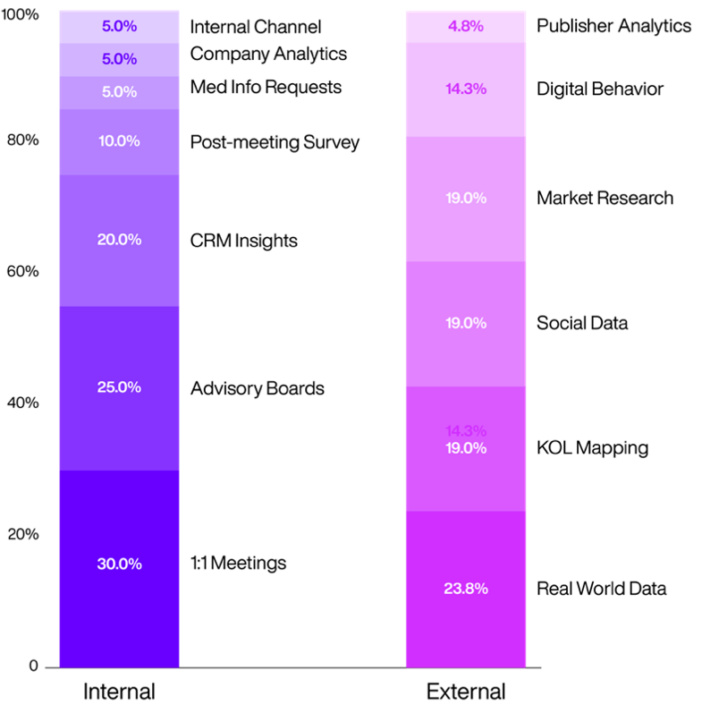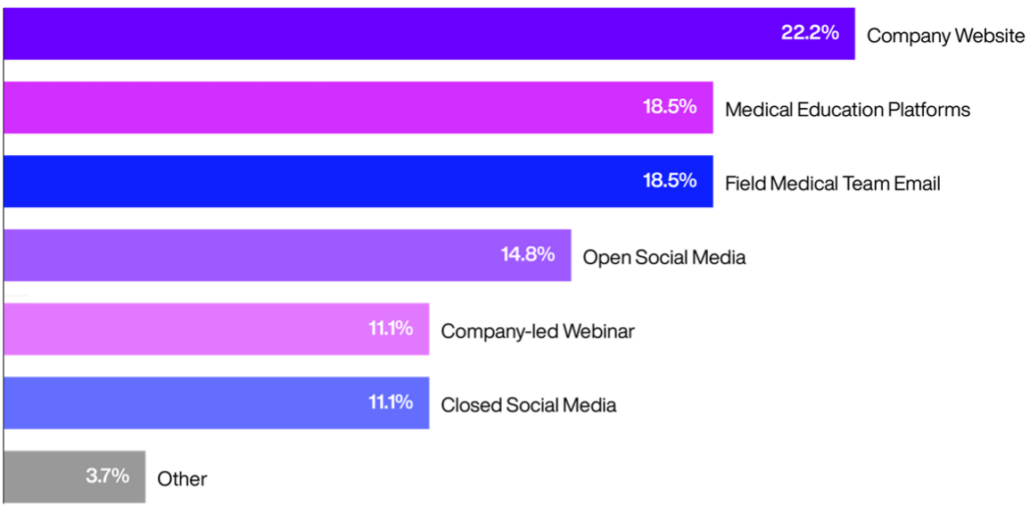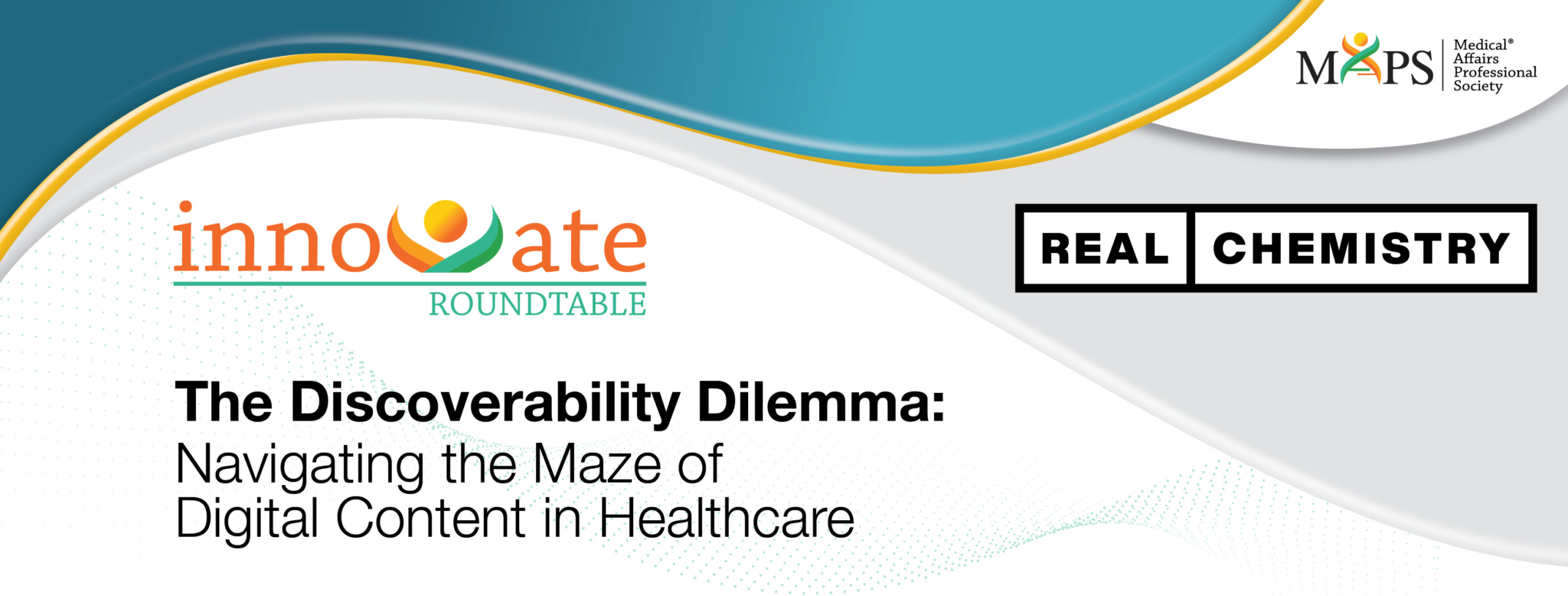The Discoverability Dilemma: Navigating the Maze of Digital Content in Healthcare
Summary of Medical Affairs Professional Society (MAPS) Puerto Rico Roundtable hosted by
Real Chemistry on March 26, 2024
Thank you to the contributors of this article:
Real Chemistry
- Uj Pyati
- Sarah Frazer
- Sabita Sankar
Co-Authors
- Robert Arcott, Merck
- Alisa Bechthold, Amgen
- Dheepa Chari, Pfizer
- Denise Clark, Amgen
- Tatjana Djakovic, Merz
- Renu Juneja, Johnson & Johnson
Discussion Summary
In March 2024, Real Chemistry held a roundtable discussion exploring current trends in scientific information exchange and engagement strategies. Industry professionals from several pharmaceutical companies explored the integration of digital platforms, artificial intelligence (AI), and personalized content to support interactions with healthcare providers (HCPs).
The discussions underscored the shift toward digital on-demand content delivery to advance scientific exchange with HCPs about a disease area or therapeutic modality, emphasizing both the need for real-time, tailored information that addresses their specific inquiries and concerns, as well as the need to ensure that they can find the content and engage with it. The panel touched upon the potential of AI in generating concise, accurate content and the importance of using omnichannel approaches to support personalized education journeys, while also ensuring compliance. In addition, they outlined the challenges of adapting traditional insight-gathering methods to a digital landscape that is rapidly transforming, where the preferences of an increasingly tech-savvy HCP demographic are significantly shaping future strategies.
The discussion reflects the transformation faced by Medical Affairs, moving toward smarter, faster, and more targeted ways of enhancing HCP engagement with emerging scientific information.
Insights to guide engagement strategy
Successful digital engagement strategies hinge on understanding the digital behaviors of HCPs and leveraging these insights to engage with maximal impact. The panel reviewed sources of insights (Figure 1) alongside potential strategies to overcome any challenges in implementing actions from insights:
- Digital insights are currently supplementing, not replacing, traditional insights. Traditional sources of insights remain focused on one-on-one meetings, advisory boards, and customer relationship manager insights; however, digital insights from sources such as online content, and social media platforms are becoming increasingly available to supplement understanding of HCP scientific journeys. Real-time insights from digital sources in particular hold promise to fill the gaps associated with scheduled and infrequent traditional insight gathering methods. An example shared by a panelist was the use of web-listening platforms (e.g., SproutSocial) to gather insights into real-word discussions to fulfil publication gaps.
- Insights from different sources need to be shared, consolidated, and analyzed to maximize strategic value. This was a current challenge for many of the panelists, whose companies have more data than ever before, but need new processes and ways of working to consolidate and translate them into actionable insights. Some are beginning to use AI for insight analysis and consolidation, while others have established dedicated planning committees to achieve these tasks and oversee insight sharing through cross-functional collaboration (including content development teams). However, the time it takes to gather, consolidate, review, and make insights actionable is much longer without using AI tools.
- Demographics have an impact on digital engagement strategy. In some disease areas, such as rheumatology, key opinion leaders may value more traditional engagement approaches and may be less likely to engage with digital channels, preferring medical science liaison (MSL) conversations; however, all panelists noted that even in these areas, newer tech-savvy HCPs will be increasingly filling top roles over the next few years. These HCPs prefer to engage with online platforms for real-time med info and digital opinion leaders (DoLs), with the trade-off being less interest in traditional, live one-to-one MSL conversations. The panellists aligned that the demographic is shifting and there is recognition that medical affairs should adapt to ensure relevance with these changes.
- Engagement strategies are still frequently measured with traditional metrics such as clicks and visits. An interesting engagement measure highlighted by one panelist was the implementation of optional, short-form, user-specific surveys across digital platforms. These surveys then update for each repeat visit, tracking the HCP learning journey and information retention across platform engagements.

Figure 1: Internal and external data and insight sources roundtable participants engage to support personalized content. 1:1 meetings were the most common internal source of insights followed by Advisory Boards. Real World Data were the most common external source of insights. Based on responses from 6 panelists; panelists could choose multiple answers.
Creating HCP personalized scientific exchange materials
Current best practice for HCP engagement incorporates traditional face-to-face methods alongside innovative digital approaches (Figure 2). Key points delivering personalized educational content within healthcare were reviewed:
- HCPs have a growing preference for on-demand access to bite-sized chunks of relevant medical information. These need to be delivered as insight-driven, personalized, modular pieces of content through an omnichannel approach, bringing the right information to HCPs through the right channel at the right time in their scientific journey.
- Pharma-sponsored scientific content on disease areas is still met with skepticism, with HCPs preferring independent, unbiased, third-party sources for this information. However, where trust can be gained, there is a clear demand for well-crafted engaging content in this space, with some of the panel seeing great success with podcasts, infographics, plain language summaries and interactive experiences. CME programs that are fair balanced, scientifically sound and developed independently by a third party are seen as a credible source of information.
- Since COVID-19, virtual MSL teams have become a flexible and efficient model for engaging with HCPs remotely, potentially increasing touchpoints without the need for physical travel. This method still allows for a personal approach, but with added convenience for both the MSL and HCP. In fact, virtual MSLs are already in early stages of evaluation at several companies. AI-driven MSL avatars may also play a part in the future virtual MSL team, with many companies in the early stages of evaluating their potential. These MSL avatars could supplement the current work of MSL teams, streamlining their workload to maximize efficiency without replacing their role entirely. However, it remains to be seen whether this more novel approach will be embraced by HCPs.
- Medical-specific social media handles have been used by some companies to deliver emerging scientific information such as publications and congress-related updates; however, these handles need to be compliantly distinguished from other company-sponsored handles from a content perspective. LinkedIn and X were cited as the two key channels for these initiatives.
- AI-enhanced engagement platforms and question-answer systems were discussed as a potential way to revolutionize HCP engagement by providing personalized real-time access to scientific information. Some of the panel highlighted that generative AI systems were already in use at their companies to generate content such as plain language summaries and other publication types—a first step to a potentially profoundly different future of content creation, particularly in terms of cost and output speed.
- Cross-functional coordination should be considered to understand how different channels are being utilized for different types of content across therapeutic areas. This will help teams avoid duplication and mixed messaging within specific digital platforms, since HCPs will be seeing the information without understanding the functional area that deployed it.

Open Social Media Networks, X (formally Twitter), LinkedIn, Facebook, etc; Medical Education Platforms, Medscape, OncLive, etc;
Closed Social Media Networks, MedShr, Sermo, etc
Figure 2: Digital platforms currently utilized by roundtable attendees to support HCP education. Based on responses from 6 panelists; panelists could choose multiple answers.
The role of compliance in digital transformation
Pharmaceutical organizations are proceeding with caution regarding the use of AI and new digital platforms, and it has yet to be fully determined how these approaches can be used while remaining compliant with regulatory requirements. The topic of compliance was revisited at various times during the discussion, with the key points being:
- Personalized, “bite-sized” content may be viewed as not comprehensive enough to meet all regulatory guidelines, with the need for fair balance being a key barrier to navigate, leading to relevant information often being buried in larger medical resources. Standard response emails to HCP questions were highlighted as an example of this, where a significant amount of reading is required by the HCP to find the answer, leaving the desired outcome to chance. Field medical teams could benefit from tailored content that supports their ability to respond to specific enquiries quickly during or after an engagement.
- Compliance should be involved early and often when exploring the use of AI and digital platforms in Medical Affairs. Late inclusion of compliance experts may lead to roadblocks in dissemination of scientific information across newer channels as they onboard, and it is imperative that generative AI technologies are integrated responsibly and transparently with medical content development.
Conclusions
The path forward for Medical Affairs in the digital era is exciting, challenging and necessary. By embracing digital transformation, fostering collaboration with compliance teams, and leveraging insights for personalized HCP engagement, Medical Affairs professionals can proactively navigate the complexities of the modern healthcare landscape through more tailored and personalized medical content. The integration of virtual and AI-enhanced platforms will further empower Medical Affairs professionals to deliver impactful, compliant, and cutting-edge scientific information to HCPs, inspiring Medical Affairs departments to be at the forefront of change and continuing to showcase their value.
As the Medical Affairs community continues to adapt and innovate, the MAPS Knowledge Center and Real Chemistry remain committed to providing evidence-based insights and strategies to support this dynamic field.
*Note that the content reflects the personal opinions of the co-authors.



